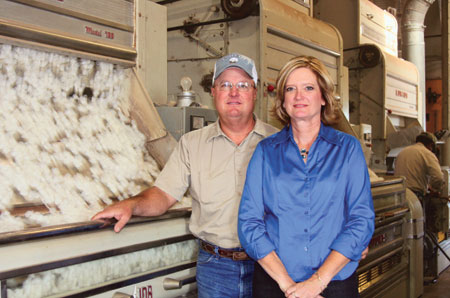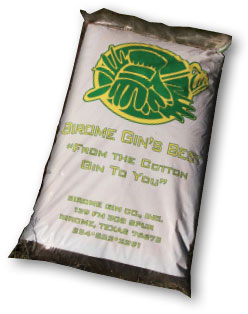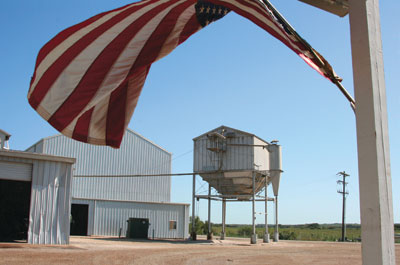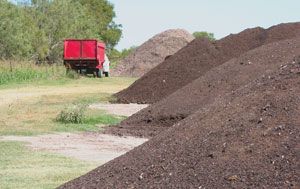
Gerry and Lisa Kasberg
Photo by Janet Hunter
It’s a glorious, sunny September morning in central Texas, where the cotton harvest is in full swing. In the tiny town of Birome, population 28, module trucks lumber into the local gin yard, hauling cotton from up to 60 miles away.
Lisa Kasberg, who owns and operates Birome Gin Co. with her husband, Gerry, is busy checking delivery reports and fielding phone calls, when the front door of the Kasbergs’ quaint old house-turned-gin office slowly opens.
“We’ve come for a load of your compost,” customer Eva FitzGerald announces. “It’s like magic for plants,” she says, proclaiming cotton compost to be the perfect remedy for hard clay soil.
“When we bought our place in McLennan County, we had three big truckloads of compost delivered, before we even started landscaping,” says FitzGerald, who’s a member of the McLennan County Master Gardeners. The compost proved to be such an effective soil conditioner that she’s come back for more.

bag of cotton compost
A Value-Added Byproduct
While ginning season is a hectic time for the Kasbergs, they are always happy to stop and sell compost, which they manufacture from gin trash. This value-added byproduct is their solution to a problem that many ginners face: how to economically dispose of the trash — cotton burrs, stems and broken seeds — that is left over after the seed and lint are separated from the plant.
In years past, Gerry would arrange with local farmers to let him spread the gin trash on their fields. Then, he started selling cotton burrs to cattle producers for use as a low-protein feed. Seven years ago, he began researching the idea of composting gin trash.
It was ‘a Gerry idea,’” says Lisa, referring to her husband’s inventiveness and entrepreneurial spirit.
His mother had always mulched and fertilized her flowerbeds with cotton burrs from the Kasberg family gin, with great success. And in West Texas, where most cotton is stripper-harvested — a practice that creates more gin trash than picker-harvesting — companies had been manufacturing gin compost for nearly a decade. There were none in central Texas, however, so the Kasbergs decided to start their own composting business, and installed a large aerobic in-vessel composter in 2007.
Three Days in the Composter
The compost is produced daily throughout the year at a rate of 15 yards per day. Every day new trash is fed into the composter, which rotates four times per hour. On the first day, the compost temperature is kept between 131 and 155 degrees Fahrenheit to kill pathogens and stop any seeds from germinating. After three days, it is ready for use. The Kasbergs, however, spread the product in long windrows on nearby fields to further decompose for several months. Once it has lost its odor, it is bagged and marketed under the label, Birome Gin’s Best, at garden stores in the Waco area.

The 100-year-old Birome Gin is the center of the Birome community.
Photo by Janet Hunter
In the spring of 2009, a Junior ROTC organization in Waco sold between 10,000 and 12,000 bags of Birome Gin’s Best as a fundraising project. Since then, the nutrient-rich soil additive has become even more popular with master gardening clubs and landscapers, who often buy it in bulk, according to Gerry.
“I think people like the idea that the compost is recycled and that it is environmentally friendly,” he says.
Today, Birome Gin is the only central Texas gin bagging compost. It is because of innovations like this and the Kasbergs’ experience and good business sense that the 100-year-old gin continues to thrive, according to the Kasbergs’ loan officer, Ryan Janek, credit office president of Texas Land Bank’s Hillsboro branch.
Reared in ginning families in Runnels County in West Texas, Lisa and Gerry had plenty of ginning experience, before acquiring Birome Gin in 1989 with his brother, Eugene. For a while, Gerry and Eugene took turns running the operation in partnership, while still managing the Kasberg family gin in the town of Miles. Finally, in 1996, the couple moved permanently to Birome, which is located 75 miles south of Dallas and 25 north of Waco. Ten years later, they bought Eugene’s share of the gin.
Financing From Farm Credit
For financing, they turned to their local Farm Credit lender, Texas Land Bank in Hillsboro, which counts a number of cotton growers among its members. Several years earlier, they had financed ranchland with Central Texas Farm Credit in Coleman, and when they needed an agribusiness loan, they knew that Farm Credit staff would understand the cotton industry, too.

Gin trash compost is spread in windrows to further decompose, before being bagged.
Photo by Janet Hunter
The first season they were in Birome, the family lived in the gin’s office building. Their son, Michael, now 23, was not quite old enough to help, and daughter Grace, now 15, was a baby. “Living in the office with a baby and going 24 hours, it was crazy,” Lisa recalls.
But from the beginning, they have done what it takes to make the business successful. In the early 1990s, they replaced their cotton trailers with module trucks. A few years later, when numerous small gins shut down rather than switch to new technology, Birome Gin upgraded to a high-volume uniform density (UD) cotton press. Today, the three-stand gin employs 22 people and handles an average of 18 bales per hour, “but it’s the number of bales you gin in a day, not the number per hour, that counts!” Gerry emphasizes.
This year, the Kasbergs ginned 16,000 bales of cotton, which is a typical crop. Last year, the drought took a toll on the company, and they ginned only 6,700 bales, which means this year’s compost stocks are starting to run low. To compensate, Gerry plans to ramp up compost production by spreading seven to 10 windrows of the product this winter.
But it’s at times like these, when the cotton crop is smaller — or when the gin trash is particularly heavy — that the Kasbergs can be glad they launched the compost business.
“Burrs used to be a cost to the gin,” Gerry says. “When it got where they didn’t cost you, it was a big deal. Now, it’s nice to be able to make a little money off them.”
- Staff